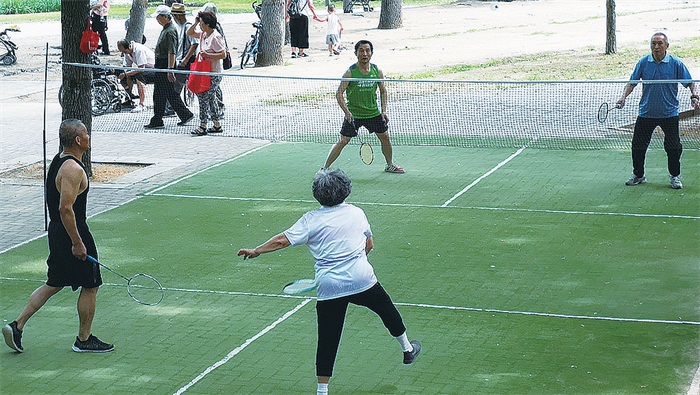In Beijing, a green belt of health and happiness


A linear park in Chaoyang and Haidian districts of Beijing offers a magnificent example of healthy city infrastructure. Yuan Dynasty Capital City Wall Site Park runs more than 9 kilometers along an east-to-west canal between the North Third Ring and North Fourth Ring roads. In addition, a pedestrian tunnel at the east end connects to a 5-km-long walking path along a river.
Assuming that the area around the park has the average urban Beijing population density of 6,000 people per square kilometer, 150,000 to 200,000 people live within a kilometer's walk from the park — and that's not counting the large number of people who work nearby. The park is adjacent to seven subway stations along four lines, so it's also easily reachable by public transportation.
As great as it is, the park is not perfect. In the eastern section, there are tunnels under most crossing roads, but in the western section, users have to leave the park to cross roads. In addition, an eight- to 10-lane highway runs parallel to the north side of one section of the park. It is especially difficult for the elderly or infirm to reach the park by crossing this street at intersections. The walk signal lasts only 40 seconds, and aggressive drivers turning right or left often pose a danger to people in the crosswalk. In addition, motorcycles come from all directions.
Unlike most linear parks, the park is not just a walking path. It averages roughly 130 to 160 meters wide, providing plenty of room for many kinds of sports or social activities. In the summer, abundant shade trees protect people from the hot sun, while in the spring, the blooming fruit trees are a popular attraction.
Every day, thousands of people use the park. Elderly people exercise, meet friends, sing or take care of grandchildren. They practice tai chi, play badminton and do group calisthenics. Hikers and dog-walkers follow the path along the top of the old earthen wall. And people stroll or jog everywhere. At lunchtime, many office workers get in their daily steps, and since the park connects offices and residential areas, many people use it as a way to get to work or to a subway station.
The wall was completed in 1276 during the Yuan Dynasty (1271-1368), known in the West as the Mongol Empire. The park was established by the city in 1988 and rebuilt in 2003 to preserve the wall and provide green space for the people of Beijing.
There are almost no tourists — people are just living their daily lives in the park. Many people say their daily exercise in the park is a key part of their lives.
Guo Chaoying, who is 59, says she does not have any chronic diseases, maybe because she walks her dog for at least 10,000 steps each day. If she didn't have a dog, she might not force herself to walk so far, she says, but her dog has a strong desire to play in the park every morning. She also says physical exercise makes her emotions much better.
David Evans, a professor at Beijing University of Chemical Technology, who is from England but has lived in Beijing for many years, says it is no fun walking on the roads, with all the electric bikes swarming around. But he is also glad to be motivated by his dog to take a healthy walk in the park each day.
Han Yuguang, 62, says the park is a very big benefit to people's lives. Some play badminton, some sing, some walk. He says it is an especially important benefit for senior citizens. Among his badminton partners, one is 71, one is 75 and another is 81. If they didn't exercise, they wouldn't be healthy, he says.
Han lives 10 kilometers away, in downtown Beijing, but he says there isn't a good place to exercise near his home. So he rides a bus fives days a week to the Yuan Dynasty park to play badminton and sing.
A retired woman, who preferred not to give her name, says she comes to the park almost every day. If she stays home, there isn't much to do, so she comes to the park to exercise and meet with her friends. She says her emotions are much better because she is able to do this.
Also in the park, a man surnamed Chen walks an hour each morning and an hour each evening. He takes his grandchild to the park during the day. He says life is based on exercise and the body is like a car — if not used, it will break down.





































